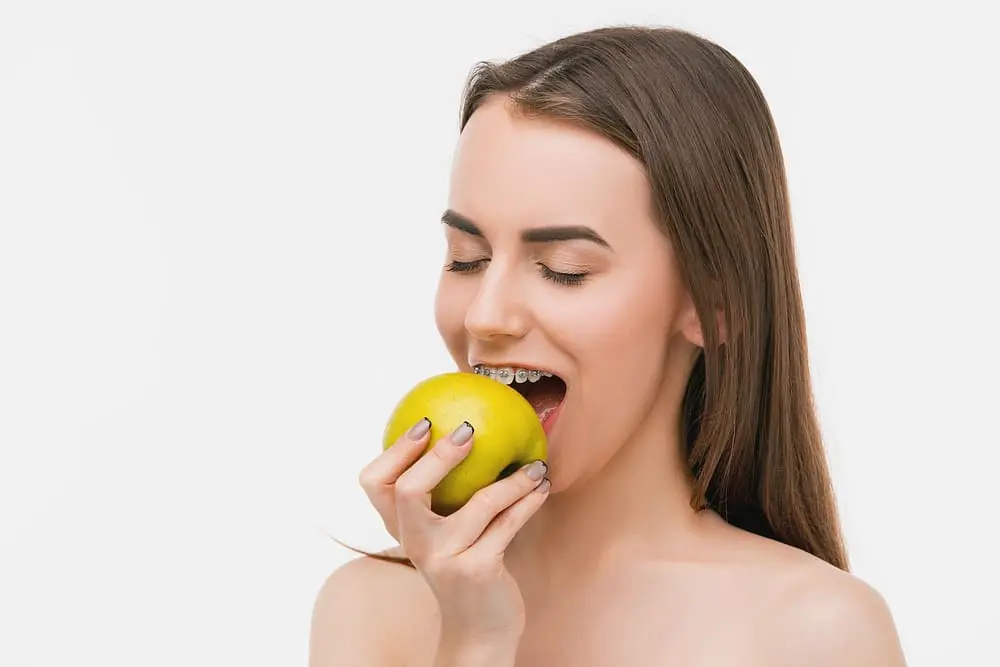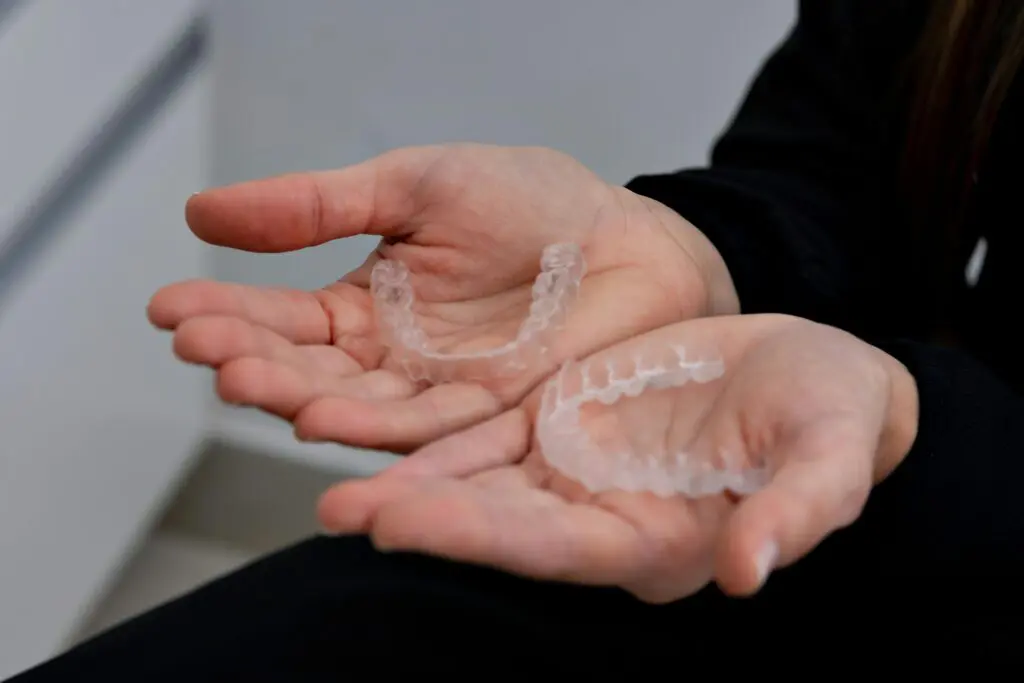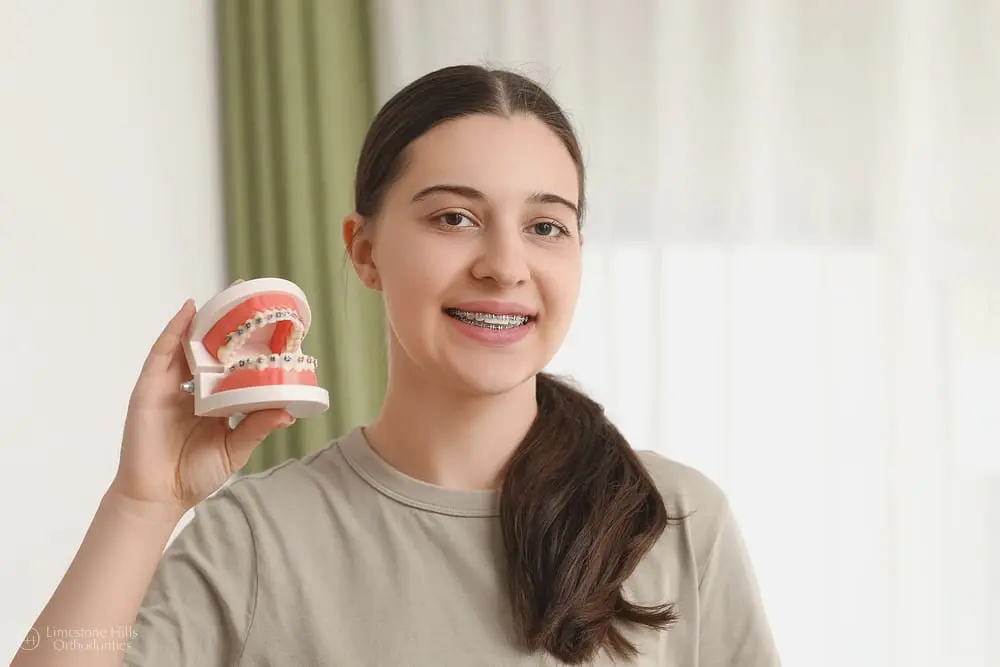Start by swishing some water around in your mouth to loosen up any food particles. You can also use your tongue to gently nudge any stubborn bits out from between the brackets. If you have access to a mirror, take a quick peek to see if there’s anything still hanging around. For those extra sticky situations, try using a clean interdental brush or a floss pick to carefully dislodge any remaining food.
At Limestone Hills Orthodontics in Austin, TX, we understand these challenges and offer practical tips to help you remove food from braces without brushing.
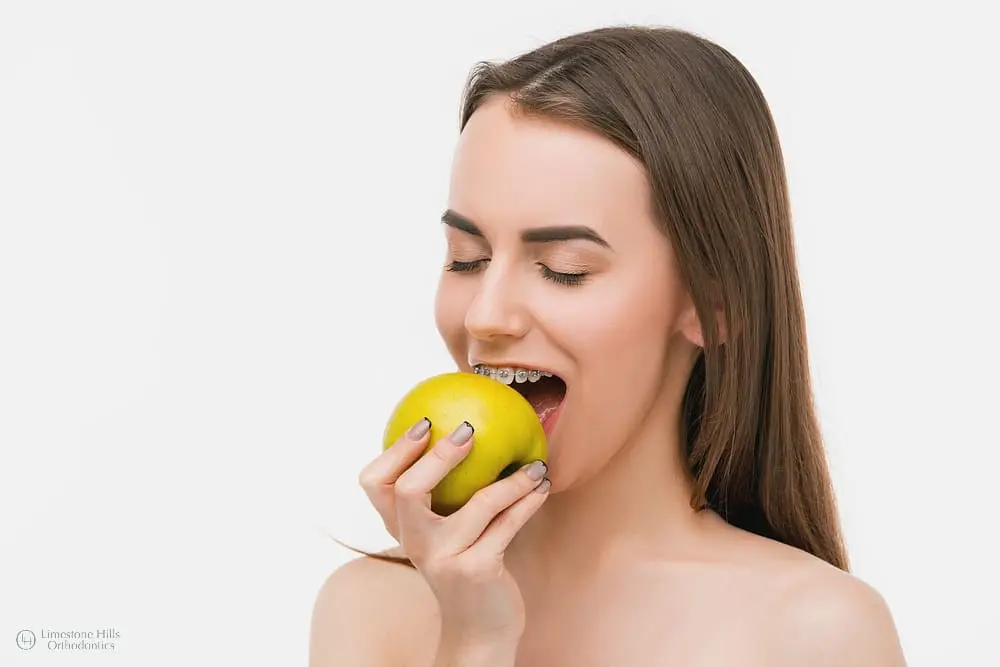
Understanding Food Debris and Braces
Braces are designed to straighten your teeth, but their brackets and wires can easily trap food. This can leave you feeling uncomfortable, especially if you don’t have a toothbrush handy after meals.
Why Removing Food Debris is Important
- Prevents Gum Disease: Leftover food can cause gum inflammation and bacteria buildup.
- Avoids Bad Breath: Food stuck in your braces can lead to unpleasant odors.
- Prevents Tooth Decay: Sugary and starchy particles can cause cavities over time if not removed.
Effective Tools for Removing Food from Braces
You don’t always need a toothbrush to clean your braces. With the right tools, you can quickly and effectively dislodge food debris after meals.
1. Dental Floss and Floss Threaders
Flossing can be tricky with braces, but a floss threader makes it easier.
- How to Use: Insert the floss into the threader and guide it under the archwire. Gently floss between teeth to remove stuck food.
- Why It Works: Floss threaders allow you to clean hard-to-reach areas where regular flossing might be difficult.
- Bonus Tip: Keep single-use threaders handy in your bag or pocket for quick clean-ups.
2. Interdental Brushes
Interdental brushes are great tools for cleaning braces on the go.
- How to Use: Slide the small brush between your brackets and wires to remove trapped food.
- Why It Works: These brushes are specially designed to clean around braces, making them very useful for detailed cleaning.
- Extra Tip: Choose brushes with a soft, flexible tip for easy maneuvering.
3. Rinsing with Water
Water is a simple and effective solution for cleaning braces when you’re in a hurry.
- How to Use: Take a sip of water and swish it around your mouth for about 30 seconds before spitting it out. Repeat a few times if needed.
- Why It Works: Rinsing helps loosen food particles stuck in your braces.
- Pro Tip: If regular water isn’t enough, carry a small bottle of saline solution or mouthwash for added cleaning power.
Preventive Measures
Preventing food from getting stuck in your braces is often easier than removing it. These small changes can go a long way in keeping your braces clean.
1. Cut Food into Smaller Pieces
Eating smaller bites reduces the chances of large food chunks getting stuck.
- How to Do It: Before eating, cut foods into manageable pieces. For example, slice apples into thin wedges.
- Why It Helps: Smaller pieces are easier to chew and less likely to cling to your braces.
2. Avoid Hard and Sticky Foods
Some foods are more likely to get stuck or damage your braces. Avoid them whenever possible.
- Hard Foods: Foods like nuts, popcorn, or hard candies can break brackets or wires.
- Sticky Foods: Items like caramel, gum, or taffy can easily cling to your braces and are very hard to remove.
- Better Choices: Opt for braces-friendly options, like yogurt, bananas, or mashed potatoes.
Additional Tips
There are a few extra steps you can take to ensure your teeth and braces stay clean, even without brushing.
1. Carry a Small Cleaning Kit
Keep a travel-sized kit with floss threaders, interdental brushes, and a water bottle. This can be especially helpful when dining out.
2. Chew Sugar-Free Gum
Chewing gum designed for braces can help dislodge loose food debris. Make sure the gum is sugar-free to prevent cavities.
3. Swish Water After Every Meal
Even if you don’t have tools on hand, make it a habit to rinse your mouth thoroughly with water after eating.
Why Maintenance Matters
Keeping your braces clean isn’t just about appearances—it’s also essential for maintaining healthy teeth and gums. Without regular care, trapped food can lead to:
- Cavities caused by leftover food sugars.
- Gum Swelling from bacteria buildup.
- White Spots or stains on teeth when braces are removed.
By using these simple tools and preventive measures, you can keep food debris at bay and protect your oral health.
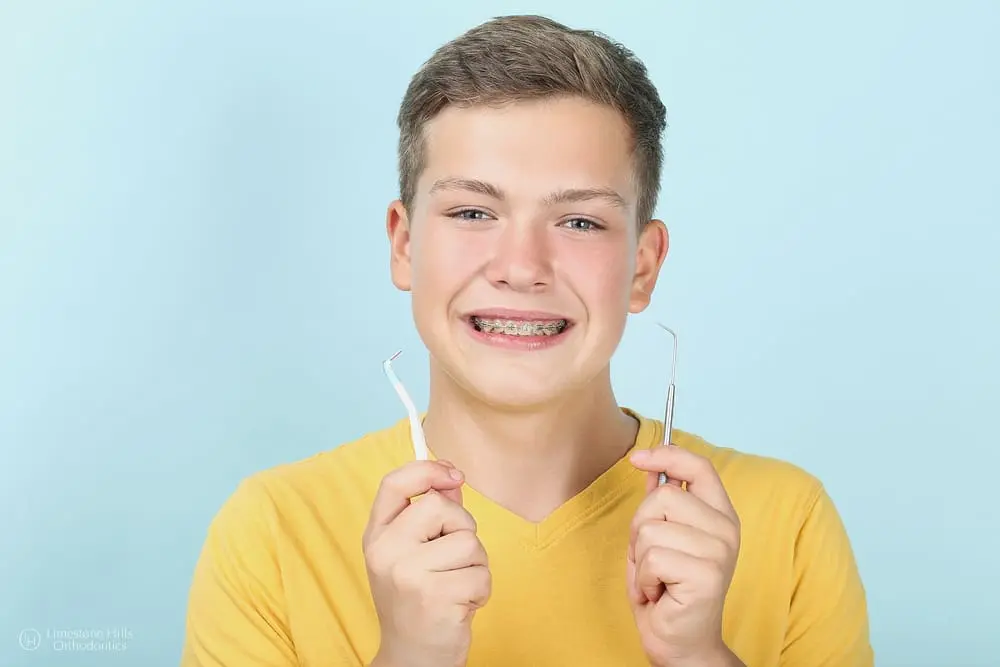
Why Choose Us for Orthodontic Care in Austin, TX?
At our Austin orthodontic office, we focus on giving each patient the best care possible. Here’s why families trust us with their smiles:
Experienced Orthodontists
Our team has years of experience treating kids and teens with jaw alignment issues. We offer effective treatments like reverse pull headgear for great results.
Customized Treatment Plans
Every smile is different! We create personalized plans that match your child’s unique needs.
Support From Start to Finish
Our friendly team will be there every step of the way, from the first visit to the final result, answering questions and making adjustments as needed.
Multiple Treatment Options
We provide a variety of choices, including reverse pull headgear, Invisalign, and traditional braces, ensuring the right fit for every patient.
Schedule Your Free Consultation Today!
Looking for expert orthodontic care in Austin, TX? Visit us for a free consultation! We’ll examine your smile, discuss personalized treatment options, and create a plan to help you achieve straight, healthy teeth. Booking is easy—give us a call or schedule online. Our friendly team is here to support you every step of the way!
About the Authors
Dr. Rodrigo Viecilli – Orthodontist in Austin, TX
Frequently Asked Questions
How to get rid of plaque in between braces?
First off, make sure you’re brushing after every meal with a soft-bristled toothbrush, paying extra attention to those tricky spots around your brackets and wires. Flossing is super important too, so try using a floss threader or orthodontic floss to get between those teeth. If you’re looking for a little extra help, consider using an interdental brush or a water flosser to reach those hard-to-clean areas. And don’t forget about mouthwash – a good antibacterial rinse can help keep plaque at bay.
What kind of brush do you use to get food out of braces?
If you’re looking to keep those braces sparkling clean and free of food bits, a handy little tool called an interdental brush is your best friend. These tiny brushes are designed to fit perfectly between the wires and brackets, reaching those tricky spots where food loves to hide. They’re super easy to use and come in various sizes, so you can find the perfect fit for your braces. Just gently wiggle it between your teeth and braces, and voilà, you’re all set for a fresh, clean smile!
